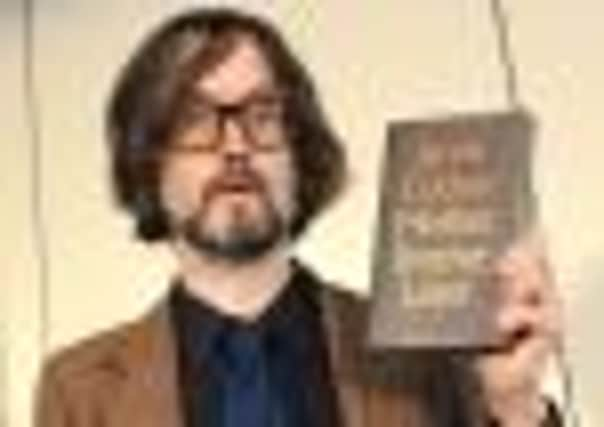Different class of lyric writer in print debut


OF all the stars from the Britpop era, Jarvis Cocker always seemed to be the most interesting.
Noel Gallagher and Damon Albarn both had the charisma but Albarn hadn’t yet blossomed into the musical innovator he would become and Gallagher was too busy either fighting with his younger brother or crowing that his band was the best in the world.
Advertisement
Hide AdAdvertisement
Hide AdCocker, though, stood out from the indie crowd and what he lacked in swagger he made up for in quirkiness and self-deprecation. The Oasis man may have been the one invited to Downing Street to hob-nob with Tony Blair, but it was Cocker who appeared on BBC’s Question Time as the de facto spokesman of the country’s youth.
There was a feeling back in the mid-90s that something exciting was happening and that Britain was once again becoming the world’s cultural capital just as it had 30 years earlier. That promise failed to materialise, or maybe people’s expectations were simply too high, for music and art never really change the world, they only enlighten and entertain it.
That’s not to say music is unimportant, far from it. The likes of Radiohead, Oasis and the Manic Street Preachers captured a snapshot of the ephemeral spirit of that time. As did Pulp. One of their biggest hits, Common People, became an anthem of the Britpop generation, with its mocking story of a rich girl pretending to be poor.
Common People typified Cocker’s writing style – his songs have a narrative anchored in everyday life – and the lyrics are among those included in a new book, Cocker’s first, called Mother, Brother, Lover – a compilation of song lyrics spanning nearly 30 years. It is published by Faber and Faber no less, who this month announced his appointment as editor-at-large. Being taken on by such a fabled publishing house is akin to finding the holy grail for poets, so for a humble songwriter to be admitted in to this exclusive club is rare indeed.
Advertisement
Hide AdAdvertisement
Hide AdBut leafing through his book, which includes 70 lyrics selected and annotated by Cocker himself, you are reminded that he is more than just a good singer who made it cool to wear corduroy.
In an essay which opens the book, Cocker explains in interesting detail the art of lyric writing. Perhaps strangely, given the fact the book is all about lyrics, he suggests that words aren’t necessarily that important to a song, using the Kingsmen’s rock classic Louie, Louie – the lyrics of which even the FBI found indecipherable – as an example.
However, he also points out there are plenty of people who buck this trend, such as Lou Reed, Jim Morrison, Nick Cave and Bill Callahan, to pick out just a few. Every songwriter approaches their craft differently, but for Cocker it is rooted in personal experience. Take the opening lines from Babies for instance: “Well, it happened years ago, when you lived on Stanhope Road. We listened to your sister when you came home from school.”
Many of his lyrics hark back to his youth spent growing up in Sheffield rather than some fantasy world. “You can live on ‘lipgloss and cigarettes,’” he writes. “There are more references to TV shows and showbiz entertainers in these songs than references to the Greek myths, but it’s all valid. You can mythologise anything if you put your mind to it. In a way it’s more fun to look for profundity in something that’s not designed to have it.”
Advertisement
Hide AdAdvertisement
Hide AdFor Cocker, even the band’s name “Pulp” fitted this ethos. It was, he says, “the perfect name for it because this was an attempt to find meaning in the mass-produced and throw-away that after all we were surrounded by on a daily basis. To sift through and find some beauty in it all.”
Mother, Brother, Lover – Selected Lyrics is out now published by Faber and Faber, £14.99.
The Pulp poet from Sheffield
I am not Jesus, though I have the same initials.
I am the man who stays home and does the dishes.
And how was your day?
Is that woman still trying to do your head in? (Dishes)
Help the aged,
one time they were just like you:
drinking,
smoking cigs
and sniffing glue. (Help the Aged)
She came from Greece, she had a thirst for knowledge.
She studied sculpture at St Martin’s College: that’s where I
caught her eye. (Common People)